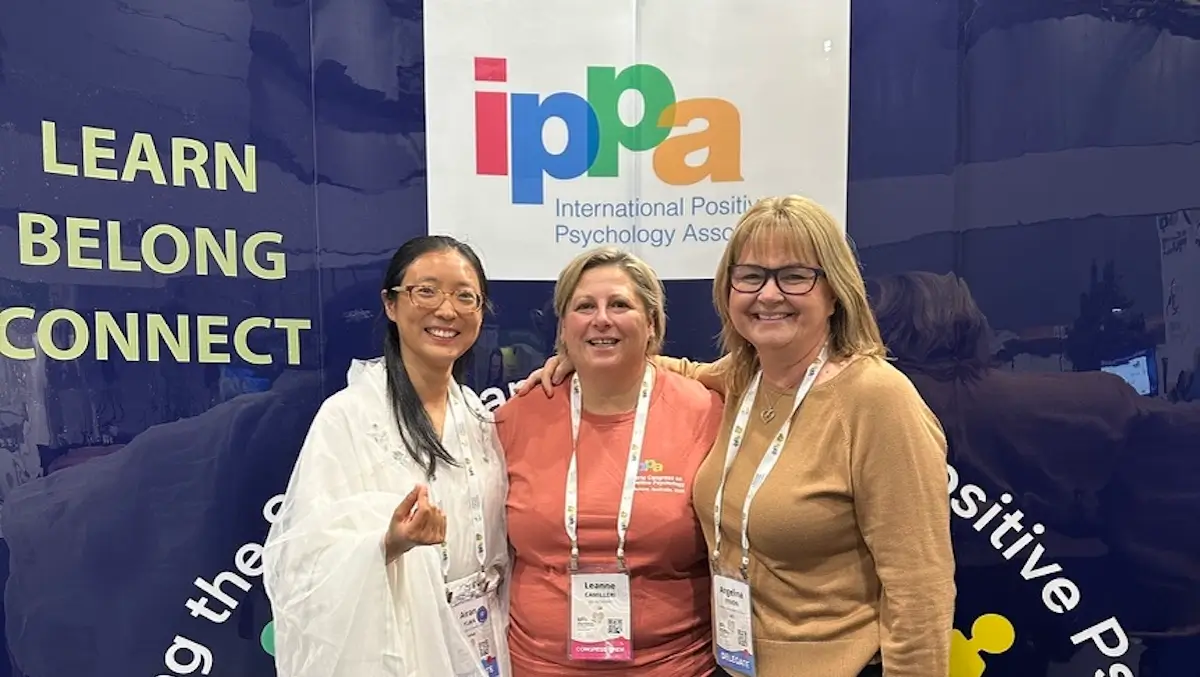Reflections from the IPPA World Congress 2025 in Brisbane
I’ve just returned from my 4th International Positive Psychology (IPPA) World Congress. Admittedly, I went with mixed feelings – excited to be reconnecting with people in the field and to be listening to and learning with researchers and practitioners from around the world. But I also felt some trepidation and a deep wondering about the relevance of some of what we’ve been doing in Positive Psychology (PP) in the current challenging global context.
Whilst I still left with more questions than answers – and a reading list that could wrap around the Convention Centre – I return home feeling re-engaged, hopeful and even excited by the questions we are asking and a clear shift in focus in PP globally. I wanted to share just a few key themes that really struck me:
👭 Broadening PP from being all about the ‘Me’
Positive Psychology has long been criticised for focusing too much on the individual. In 2023, I noted a big difference between what we were talking about in Australia (systems informed PP), and the continuing focus on individual agency and wellbeing originating from the U.S. This Congress, however, marked a notable shift in emphasis from personal flourishing to the urgent need to focus on collective and systemic wellbeing.
- In my favourite session of the Congress, meaning and purpose expert Michael Steger posed the confronting question of whether what we have been doing as positive psychologists is really making a difference in the world? Does making individuals happier really make our world better? He shows that there is little evidence to suggest this is the case. Steger is calling for a reorientation of the field – building on work by Peggy Kern, Tim Lomas and others – to a Regenerative Positive Psychology. A field that includes not only individuals and the human context, but all systems that support and sustain life. His excellent journal article on this topic is here.
- Barbara L. Fredrickson shared some of the work her and her team are doing at community level using positivity resonance. She stressed the importance of shared, face-to-face positive emotion with others and spoke to how we can set up the conditions that build trust and higher quality connections.
- One of the founding fathers of PP, Martin Seligman asked us to expand our moral circles to get out of the narrowness of tribalism. He also called for more breadth of disciplines on company boards to shift the focus from purely finance and governance; and for more positive psychologists to enter politics! Seligman’s upcoming book on agency explores how we balance I-agency and We-agency.
🌱 Growth Through Struggle
Have we forgotten how to struggle and grapple with new ideas or activities? Growth and transformation come through struggle. How do we support the future generations through the inevitable ups and downs of life when so much information and instruction on what to do and how to feel is available instantaneously via chatbot or a tiktok influencer?
- Lea Waters AM, PhD talked about growth through adversity and how through incremental, small steps – for example, a small moment of positive human connection - we build resilience that can increase our capacity over time.
- Tal Ben-Shahar encouraged us to embrace complexity, draw from multiple disciplines, and support learners to work through the difficult, not avoid it.
👩🏼🎓 A reminder of the Gift of Great Teachers
Whilst many IPPA members are Teachers – either in schools or universities – the role of ‘teacher’ applies more broadly than simply to those settings. For those like me who are coaches and facilitators (and sessional educators), part of our role is also to be a teacher. I take that very seriously and view it as an incredible privilege and responsibility.
I discovered Positive Psychology in 2004, and it has shaped my approaches to work and life ever since. The pioneers of PP have been my teachers (many mentioned above) but in 2007, I had the honour of being taught by Tal Ben-Shahar on a 3 day masterclass in positive psychology in Melbourne. Those three days significantly changed my life (and the lives of many of the other 25 people on that program). Tal is an extraordinary teacher – he brings theory to life through story. When you learn from Tal, you learn from history, from philosophy, from theology, from art. To be taught by Tal is not just a masterclass on the topic he is teaching it is a masterclass in teaching excellence. Seeing Tal again at IPPA was a reminder of how great teachers make such a difference. James Pawelski introduced Tal by reminding us that his Harvard unit was the most popular unit at the business school – students queued to get a place in that course. His teaching inspires my own.
Completing the MAPP at the University of Melbourne was another turning point in my practice. I am especially grateful to Peggy Kern and Aaron Jarden brilliant, generous educators who are pioneers in a positive psychology that looks beyond the individual. Their work and teaching continue to influence my practice and I am ecstatic to see that what they have been talking about for nearly a decade in PP, is now well and truly the directional focus. Peggy’s work on systems-informed PP was mentioned in Michael Steger’s address and Aaron was awarded at the congress for his contribution to the field – to loud cheers from the Uni Melb cohort in the audience.
I also spent time with my daughter’s favourite teacher her primary school Head Teacher Annabelle Knight. I sent my daughter to St Michael’s after meeting Annabelle in the PP community and she now runs and incredible business called IllumiKnight that supports women through motherhood and other life transitions.
I look forward to reading, learning and practicing more from what was a rich an insightful conference.
If you were at the Congress, I’d love to hear what stood out for you – with so many concurrent sessions running, I know I missed a lot too!
#PositivePsychology #IPPA2025 #MAPP #MeaningfulWork #Wellbeing #Flourishing







